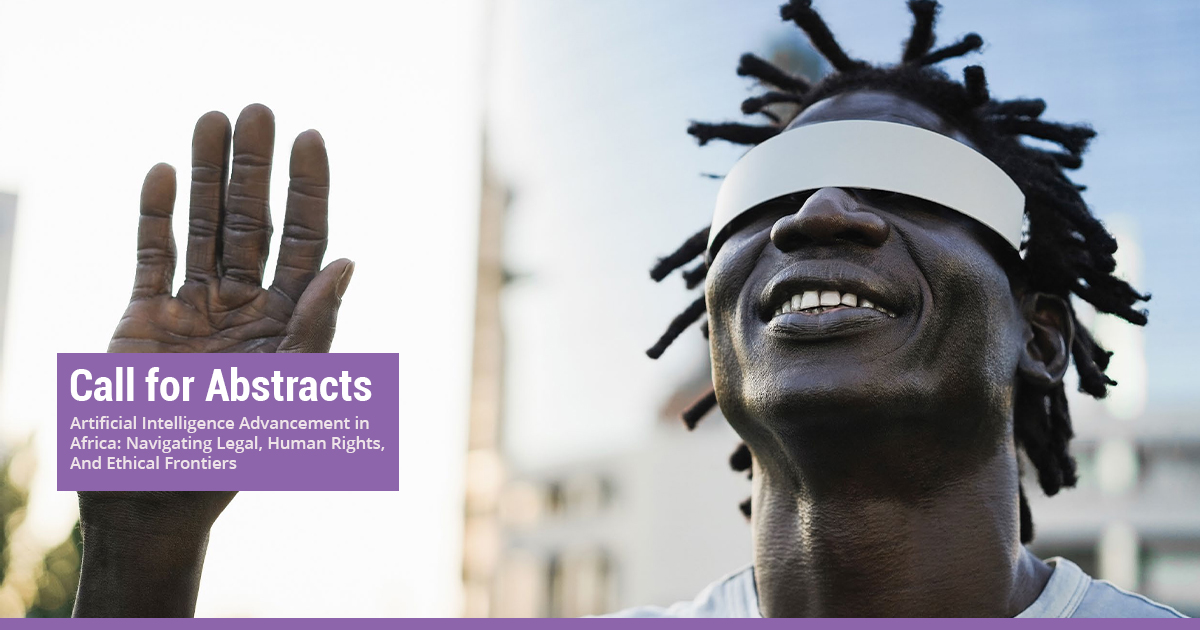The Centre for Human Rights, Faculty of Law, University of Pretoria in collaboration with the University of the Western Cape and University of Cape Town invite scholars to submit abstracts of no more than 300 words on Artificial Intelligence Advancement In Africa - Navigating Legal, Human Rights, and Ethical Frontiers.
Background:
Artificial Intelligence (AI) is rapidly transforming societies and economies worldwide, offering unprecedented opportunities for innovation, efficiency, and growth. In Africa, AI has an immense potential to address pressing challenges in healthcare, agriculture, education, business, finance and governance. However, its development also raises complex legal, human rights, and ethical considerations that require careful attention and thoughtful regulation. This book will explore these multifaceted issues within the African context.
- Overview of AI technologies and their applications in African contexts.
- Examination of the current state of AI development in Africa and its implications for legal frameworks, human rights, and ethical norms.
- Analysis of legal frameworks and regulatory approaches to AI governance in African countries and regional organizations
- Analysis of the challenges and opportunities of AI adoption in various sectors, including education, healthcare, agriculture, finance, trade, criminal justice and others.
- The role of law and policy in regulating AI technologies, ensuring accountability, transparency, and fairness.
- Investigation of the potential impact of AI on human rights, privacy, data protection, and social inequality in African societies.
- Examination of human rights implications of AI, including issues of privacy, discrimination, and freedom of expression.
- Identifying best practices, guidelines, and principles for promoting responsible AI innovation and deployment in Africa.
- Exploration of ethical considerations in AI design, development, and deployment, with a focus on cultural sensitivity and social impact.
- Comparative analysis of international guidelines and frameworks for AI governance and ethics.
- Perspectives from diverse stakeholders on the opportunities and challenges of AI development in Africa.
The book will adopt an interdisciplinary approach, drawing on insights from law, ethics, social sciences, computer science, development studies and any other related discipline. It will combine desk research, legal analysis, case studies, interviews, and stakeholder consultations to provide a comprehensive and balanced perspective on the complex issues surrounding AI development in Africa.
The book is intended for policymakers, legislators, legal practitioners, researchers, academics, civil society organizations, technology developers, and anyone interested in understanding the legal, human rights, and ethical implications of AI development in Africa. It will serve as a valuable resource for informing policy debates, guiding regulatory interventions, and promoting responsible AI innovation and deployment in the region.
By shedding light on the legal, human rights, and ethical dimensions of AI development in Africa, this book aims to contribute to informed decision-making, policy development, and public debate on AI governance. It seeks to raise awareness of the opportunities and challenges associated with AI adoption and to foster a culture of responsible innovation that respects human rights, promotes equity, and enhances societal well-being in Africa.
In conclusion, the book ‘Artificial Intelligence Advancement In Africa: Navigating Legal, Human Rights, And Ethical Frontiers’ will provide a timely and comprehensive exploration of the complex issues surrounding AI development in Africa. By addressing legal, human rights, and ethical considerations, the book aims to support the responsible and inclusive deployment of AI technologies for the benefit of African societies, while mitigating potential risks and challenges. Through collaboration and dialogue, stakeholders can work together to harness the transformative potential of AI in ways that uphold fundamental rights, promote social justice, and advance sustainable development in Africa.
Abstracts of no more than 300 words inclusive of keywords should be sent to the editors:
Dr Dorcas Basimanyane: basimanyane.k@up.ac.za
Please, take note of the following dates:
- 30 May 2024- deadline for submission of abstracts. Acceptance of abstracts to be communicated on a rolling basis.
- 20 December 2024 deadline for submission of draft chapters
- Publication late 2025 (Date to be Confirmed).
Edited by:
- Dorcas Basimanyane (LLD), Faculty of Law, University of Pretoria
- Tinyiko Ngobeni (LLD), Faculty of Law, University of Pretoria
- Prof Nkatha Murungi, (LLD), Faculty of Law, University of Pretoria
- Tinashe Kondo (LLD), Faculty of Law, University of Western Cape
- Justice Alfred Mavedzenge (PhD), Faculty of law, University of Cape town
Publisher: To be confirmed
All chapters will undergo a double-blind peer-reviewed process and should adhere to the Pretoria University Press (PULP) reference style, and should not exceed 8,000 words, inclusive of reference lists.


